Attitude and behaviour influence each other in a complex relationship. Attitude, which is one's thoughts or opinions, can predict behaviour when other influences are minimized, the attitude closely corresponds to the behaviour, and the attitude is strong. Conversely, behaviour can shape attitude through social roles defining behaviour and attitudes, the "foot-in-the-door" effect where small commitments lead to larger ones, and people justifying their actions to maintain consistent attitudes. The relationship is circular rather than strictly one-way, as behaviours and attitudes generate each other depending on the situation.
![Page 1 of 10
DEPARTMENT OF ENVIRONMENTAL MANAGEMENT, ESUT BUSINESS
SCHOOL, ENUGU
DOES BEHAVIOUR
INFLUENCE ATTITUDE OR
DOES ATTITUDE
INFLUENCE BEHAVIOUR
SOCIAL PSYCHOLOGY (EBS 667)
ANTHONY EMEKA ALU
(PG/EMSc./08/3332)
JUNE. 2010
[ABSTRACT
Attitudes are generally positive or negative views of a person, place, thing, or event – this is
often referred to as the attitude object. People can also be conflicted or ambivalent toward an
object, meaning that they simultaneously possess both positive and negative attitudes toward the
item in question (Wikipedia, 2010). Behaviour is the response(s) – the way in which a person,
organism, or group responds to a specific set of conditions. While many social psychologists
study social influences on behaviour, others focus on the changing of attitudes. The question that
“does behaviour affect attitude or does attitude affect behaviour?” is likened to the question “egg
and hen or chicken – which one came first?” Myer (2002) observes that our attitudes will predict
our behaviour on three conditions – if ‘other influences’ are minimized; if the attitude
corresponds very closely to the predicted behaviour; and if the attitude is potent. Conversely,
behaviour or action can affect or mold our attitudes in the following ways – through the ‘foot and
door’ phenomenon; through prescribed social roles which mold the attitude of the role player;
and the tendency for people to defend or justify already executed actions. Both attitude and
behaviour generate each other. As much as Thought (Attitude) is the child of Action
(Behaviour), Action is also the child of Thought; that is why people think then act at times and at
other times, act before thinking.]](https://image.slidesharecdn.com/8b217547-52e4-4271-a493-1579d79e5bb7-150321162356-conversion-gate01/75/ATTITUDE-AND-BEHAVIOUR-1-2048.jpg)
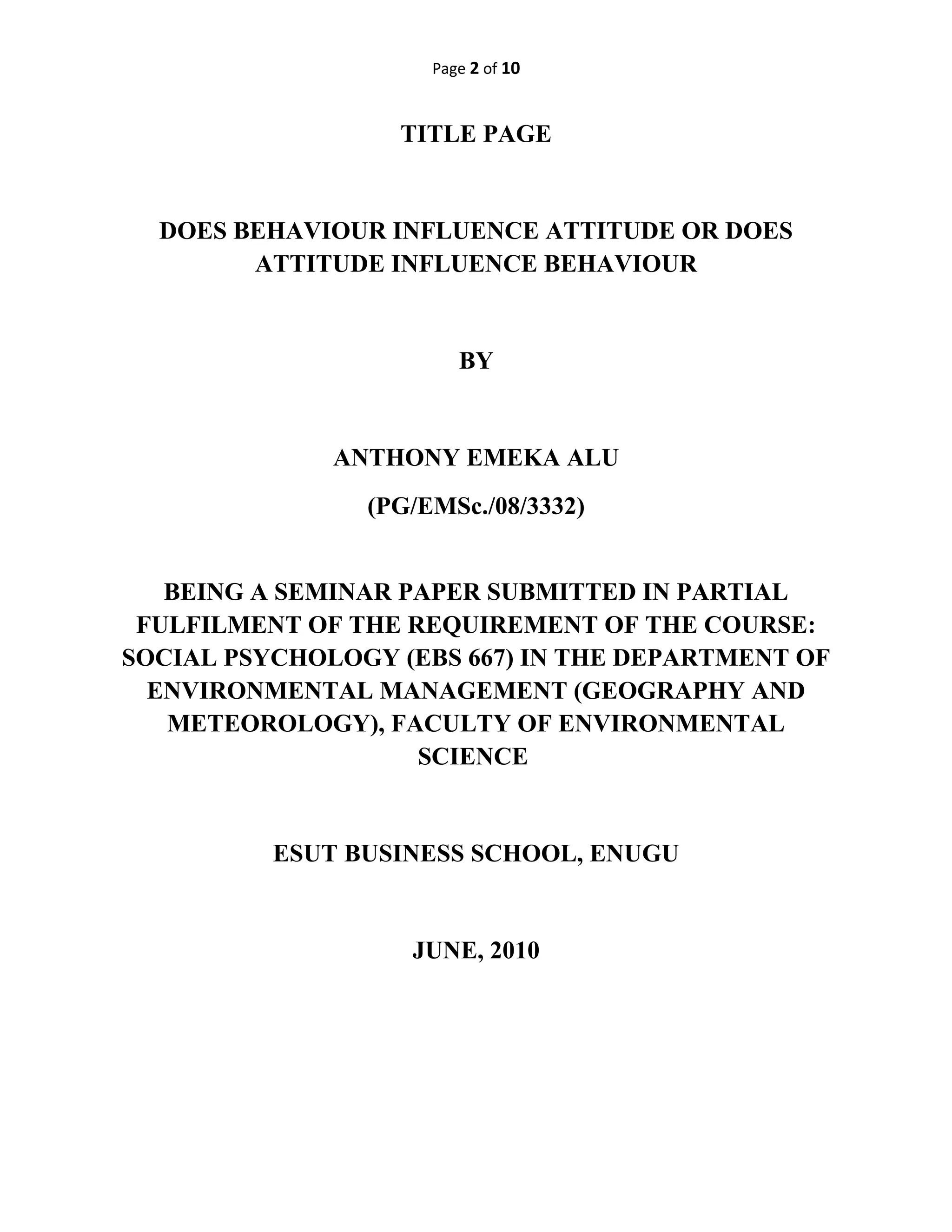
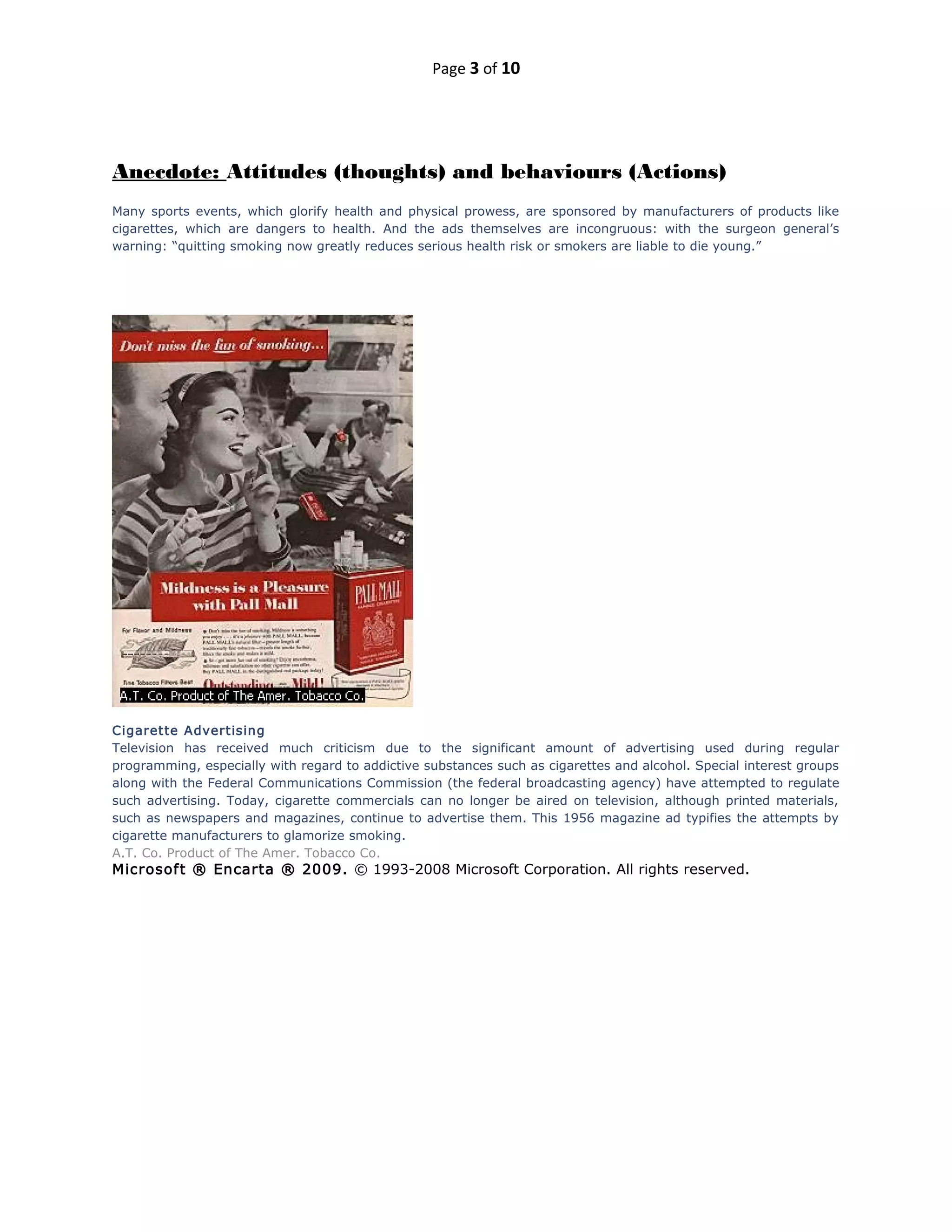
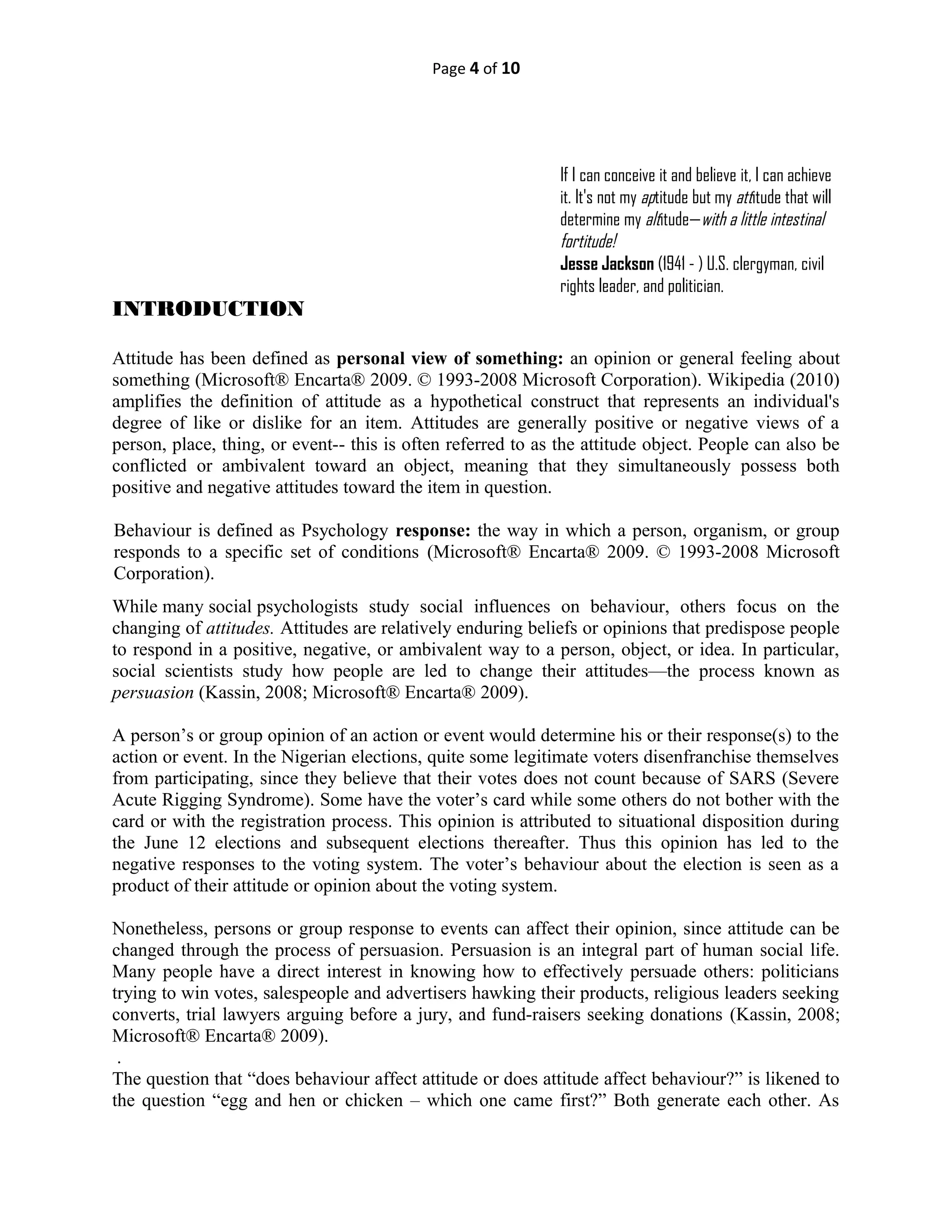
![Page 5 of 10
much as Thought (Attitude) is the child of Action (Behaviour), Action is the child of Thought;
that is why people think then act at times and at other times, act before thinking.
HOW ATTITUDE AFFECTS BEHAVIOUR
Attitude is a favourable or unfavourable evaluative reaction toward something or someone,
exhibited in one’s beliefs, feelings, or intended behaviour (Myers, 2002:130).
Attitude is one of Jung's 57 definitions in Chapter XI of Psychological Types. Jung's definition of
attitude is a "readiness of the psyche to act or react in a certain way" (Jung, [1921] 1971:par.
687; Wikipedia, 2010). Attitudes very often come in pairs, one conscious and the other
unconscious. Within this broad definition Jung defines several attitudes in dualism.
The main (but not only) attitude dualities that Jung defines are the following.
• Consciousness and the unconscious. The "presence of two attitudes is extremely frequent,
one conscious and the other unconscious. This means that consciousness has a
constellation of contents different from that of the unconscious, a duality particularly
evident in neurosis" (Jung, [1921] 1971: par. 687).
• Extraversion and introversion. This pair is so elementary to Jung's theory of types that he
labeled them the "attitude-types".
• Rational and irrational attitudes. "I conceive reason as an attitude" (Jung, [1921] 1971:
par. 785).
• The rational attitude subdivides into the thinking and feeling psychological functions,
each with its attitude.
• The irrational attitude subdivides into the sensing and intuition psychological functions,
each with its attitude. "There is thus a typical thinking, feeling, sensation, and intuitive
attitude" (Jung, [1921] 1971: par. 691).
• Individual and social attitudes. Many of the latter are "isms".
In addition, Jung discusses the abstract attitude. “When I take an abstract attitude...” (Jung,
[1921] 1971: par. 679). Abstraction is contrasted with concretism. “CONCRETISM. By this I
mean a peculiarity of thinking and feeling which is the antithesis of abstraction” (Jung, [1921]
1971: par. 696). For example "i hate his attitude for being Sarcastic (Wikipedia, 2010).
Before the 1960s, social psychologists held that people’s attitude governs their behaviour,
implying that what the mind perceives and conceives (the process of thought) the mind achieves
(the process of action).](https://image.slidesharecdn.com/8b217547-52e4-4271-a493-1579d79e5bb7-150321162356-conversion-gate01/75/ATTITUDE-AND-BEHAVIOUR-5-2048.jpg)
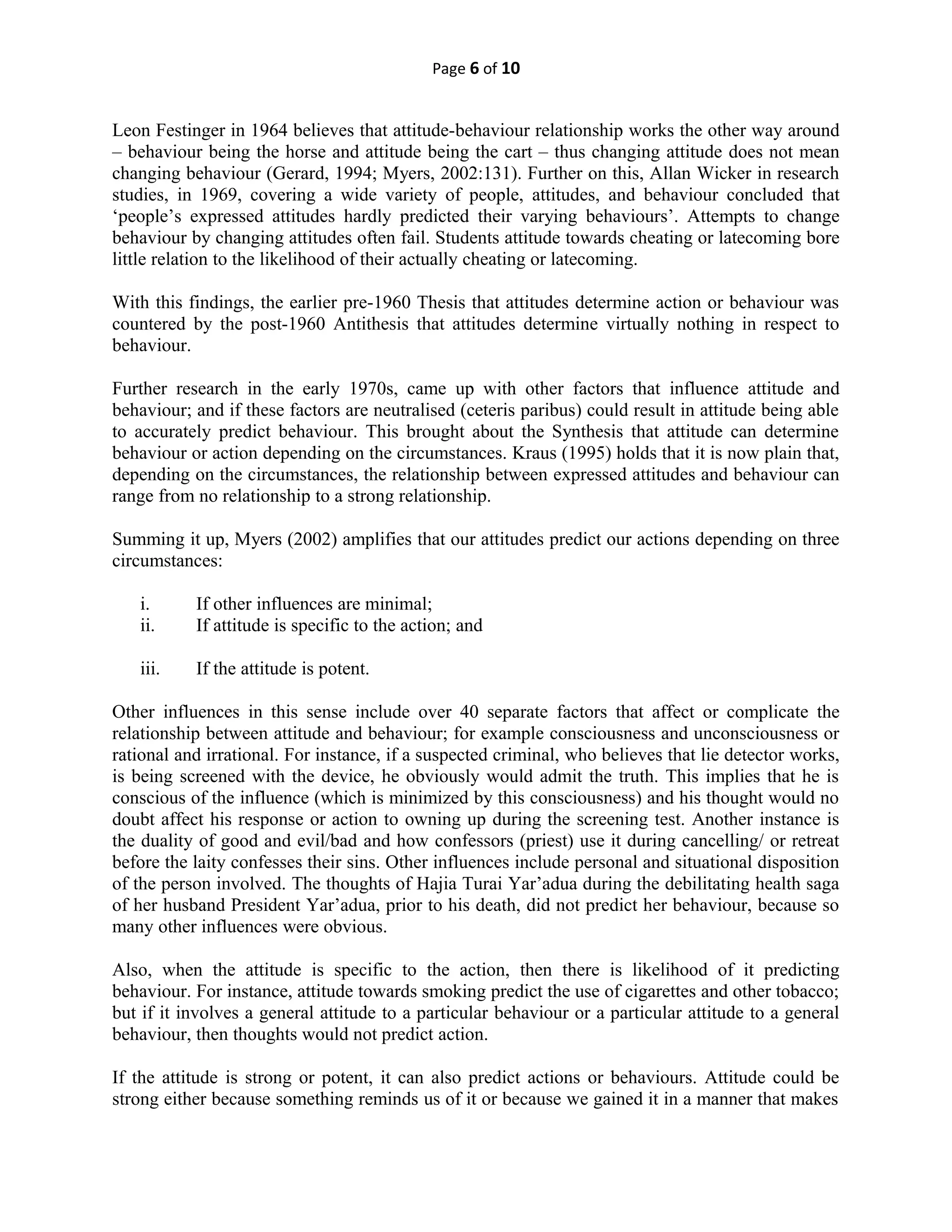
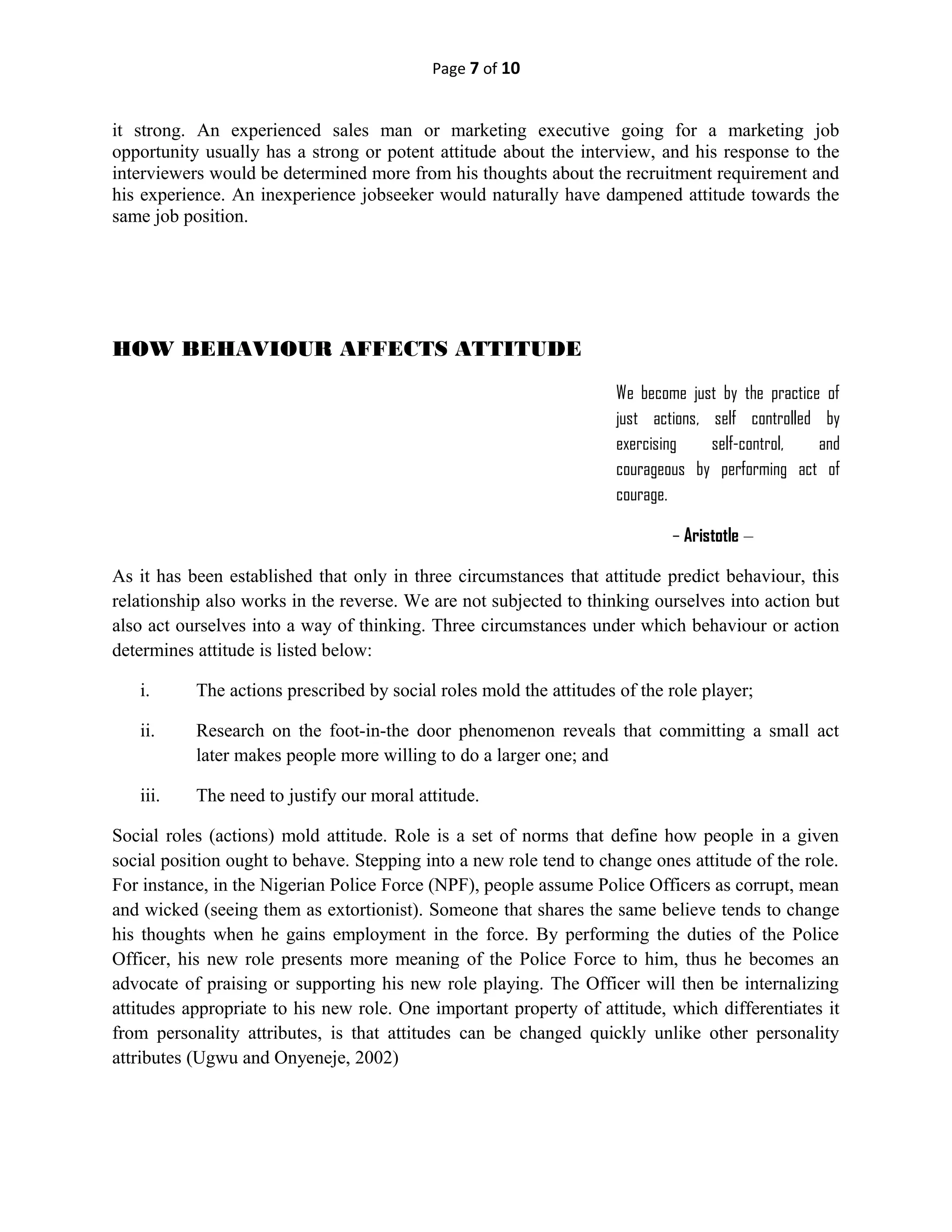
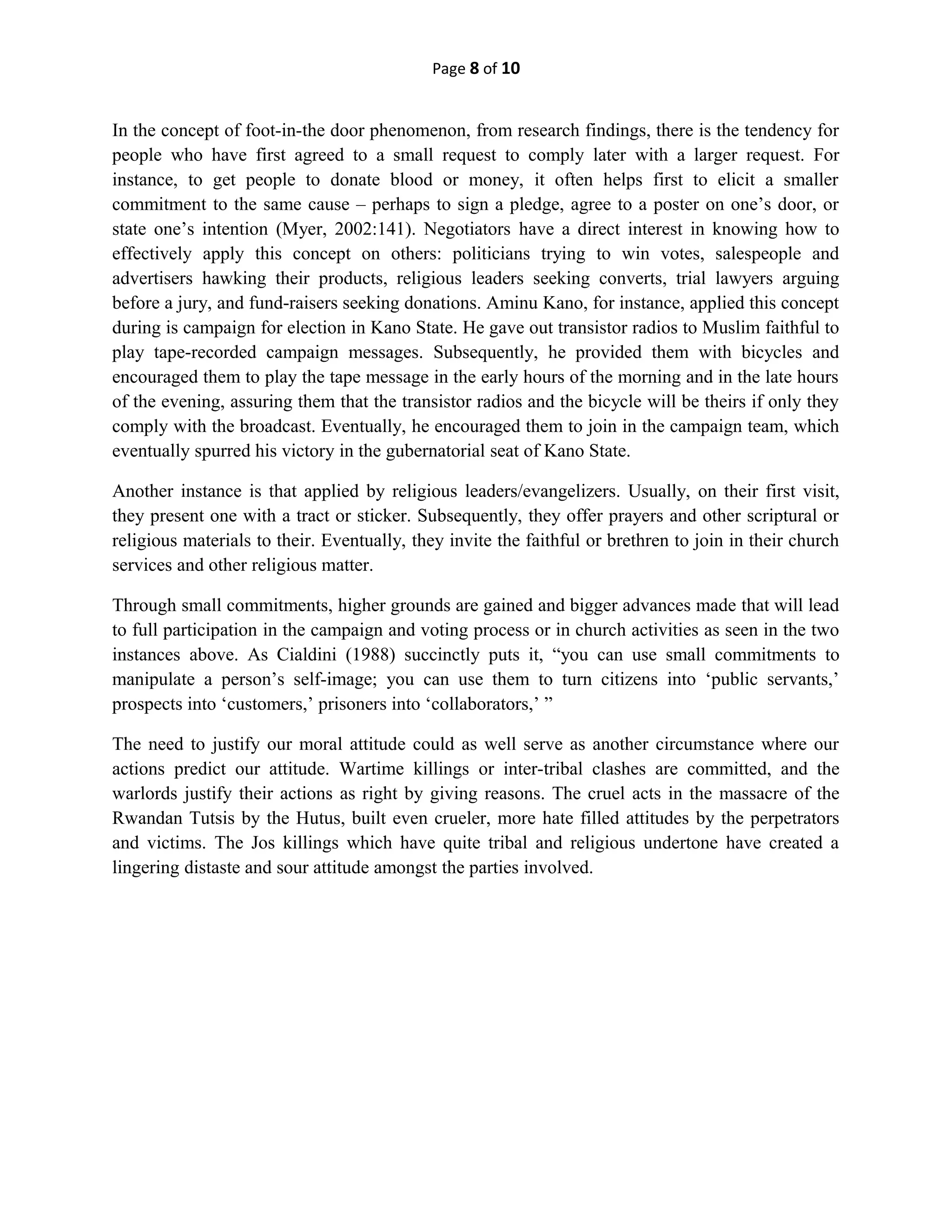
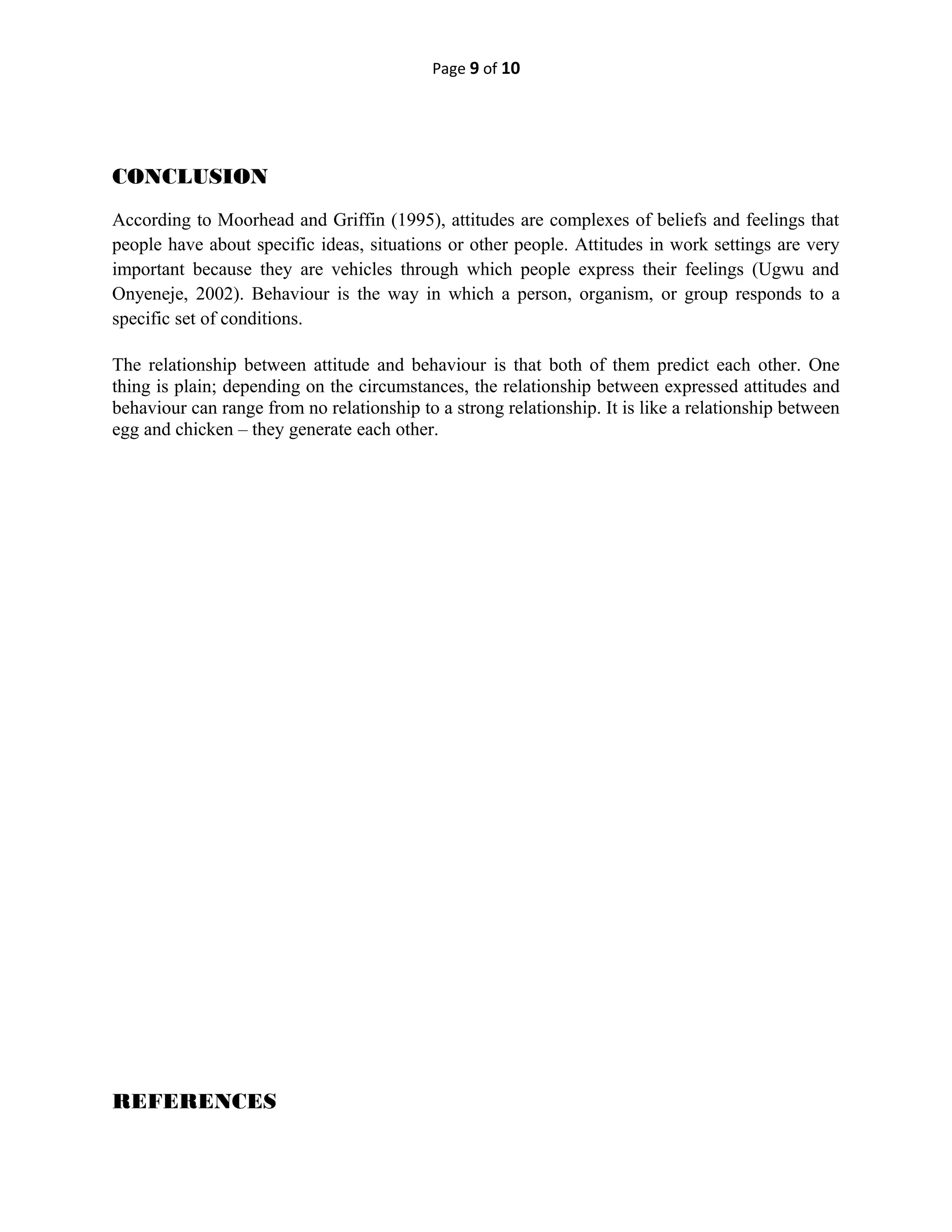
![Page 10 of 10
Cialdini, R. B. (1988). Influence: Science and practice. Glenview, III. : Scott, Foresman/Little,
Brown. pp. 142, 149.
Gerald, H. B. (1994). A retrospect review of Festinger’s A theory of cognitive dissonance.
Contemporary Psychology, 39, 1013-1017. p. 131.
Jung, C.G. [1921] (1971). Psychological Types, Collected Works, Volume 6, Princeton, NJ:
Princeton University Press. ISBN 0-691-01813-8.
Kassin, Saul (2008). "Social Psychology." Microsoft® Encarta® 2009 [DVD]. Redmond, WA:
Microsoft Corporation, 2008.
Kraus, S. J. (1995). Attitudes and the prediction of behaviour: A meta-analysis of the empirical
literature. Personality and Social Psychology Bulletin, 21, 58-75. pp. 132, 135.
Microsoft® Encarta® 2009 (2009). Encarta Dictionaries, Microsoft® Encarta® 2009 [DVD].
Redmond, WA: © 1993-2008 Microsoft Corporation.
Moorhead, G and Griffin, R. (1995). Organization Behaviour. Houghton: Miffin.
Myers, D. G. (2002). Social Psychology. 7th
Ed. Boston: McGraw-Hill.
Ugwu, L. I. and Onyeneje, E. C. (2002). Foundations of Industrial and Consumer Psychology.
Enugu: Our Saviour Press Ltd.
Wikipedia, (2010) “Psychological attitude” – Wikipedia, the free encyclopedia.htm (Retrieved
from "http://en.wikipedia.org/wiki/Attitude_(psychology)") Website visited on 14/07/2010
6:37pm LZT.](https://image.slidesharecdn.com/8b217547-52e4-4271-a493-1579d79e5bb7-150321162356-conversion-gate01/75/ATTITUDE-AND-BEHAVIOUR-10-2048.jpg)